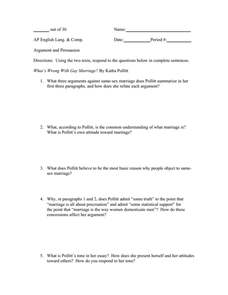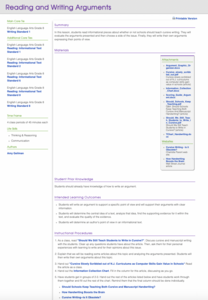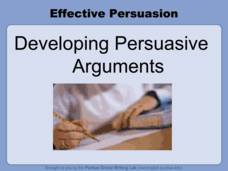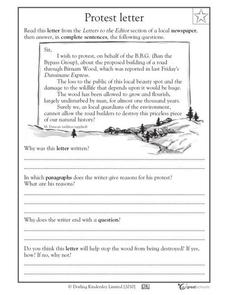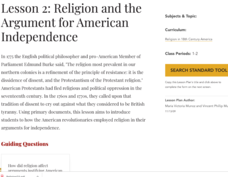EngageNY
Mid-Unit Assessment: Analyzing an Author’s Argument and Text Structure
William Shakespeare: a writer, a poet, a fake? For their mid-unit assessments, scholars read an excerpt from the article "The Top Ten Reasons Shakespeare Did Not Write Shakespeare" by Keir Cutler. Next, they analyze the author's argument...
Curated OER
Determining Author's Point of View: The Sneeches
Determine the author's point of view in a text. Young readers read Dr. Seuss' The Sneeches and identify the author's purpose in the story. They identify persuasive techniques in writing, asking and answering questions to better...
Curated OER
Identify Genre, Subgenre, and Author's Purpose
Explore genre, subgenre, and author's purpose in this helpful worksheet. Middle schoolers read several summaries of books and short stories, and identify the genre and subgenre. They also determine if the author's purpose is to...
Curated OER
Identify and Discuss the Author's Purpose
Examine author's purpose in a persuasive text using this scaffolded plan. You essentially have a verbatim script here, but it can definitely be used as an outline instead. Review questions that readers should ask themselves when...
National Endowment for the Humanities
The Argument of the Declaration of Independence
When in the course of a course on historic American events, it becomes necessary for learners to examine, with decent respect, the Declaration of Independence, it becomes evident that there are six separate and equal parts of that...
Curated OER
Argument and Persuasion: What's Wrong With Gay Marriage?
The topic of gay marriage has gotten lots of attention recently. Without actually asking your class their personal opinions, this two-page worksheet has pupils study two essays about gay marriage. Readers analyze the attitude, tone, and...
Curated OER
Reading and Writing Arguments
Should schools continue to teach cursive writing? After reading and considering the merits of a series of arguments on both sides of this proposition, class members choose a side of the issue and craft their own argument, drawing support...
Curated OER
Effective Persuasion: Developing Persuasive Arguments
Use research to strengthen a persuasive argument. Examples of ethos, logs, and pathos are presented, and learners discuss how using research can improve one's argument. Pair this presentation with an example persuasive piece to point out...
Curated OER
Author's Day
Have your learners choose an author to study. One resource link gives a list of approved authors. Scholars read at least three works produced by that author and produce three separate book reports as well as a two-page author report....
K20 LEARN
Argument Is Everywhere: Introduction to Argument
C.E.R = Claim + Evidence + Reasoning. That's the framework behind building a solid piece of argument writing. Introduce young writers to this format with an engaging lesson that uses YouTube videos and a PowerPoint to illustrate the...
Prestwick House
Writing Arguments in Response to Nonfiction
Emotional appeal or argument? That is the question. An informative instructional activity helps your class recognize the difference between a logical argument and an emotional appeal and learn how to craft an argumentative response....
Curated OER
Using Details from Text to Identify Author's Purpose
Explore writing techniques by analyzing newspapers and magazines with middle schoolers. They will collaborate in small groups to read local news stories and identify the main ideas and author's intent. They also utilize an information...
EngageNY
Annotating the Text and Identifying Argument, Claims, and Evidence: “Double Whammy” Excerpt from “The Exterminator"
That's a double whammy! Scholars read the excerpt Double Whammy from The Exterminator. After identifying the gist of the text, they annotate by marking the author's claim. The group discusses what is meant by double whammy and complete...
ReadWriteThink
Analyzing Famous Speeches as Arguments
A speaker, a message, an audience. After analyzing these elements in Queen Elizabeth's speech to the troops at Tilbury, groups analyze how other speakers use an awareness of events, and their audience to craft their arguments....
Turabian Teacher Collaborative
Parts of Argument II: Article Critique
Break down the parts of argumentative writing with a critical thinking activity. High schoolers read an article of your (or their choice), and use a graphic organizer to delineate the ways the author structures his or her arguments.
National Endowment for the Humanities
A Defense of the Electoral College
Each presidential election year, the debate about the electoral college rages. Michael C. Maibach's "A Defense of the Electoral College" offers young political scientists an opportunity to examine a reasoned argument for why the...
Curated OER
Protest Letter
What a fantastic resource to guide youngsters in persuasive letter writing. They read a brief letter to the editor and answer question about the author's purpose, word choice, and structure. Next, scholars draft their own letter by...
Curated OER
Press Review
How can word choice affect a political speech? Middle and high schoolers examine the text of the 1999 State of the Union Address, and then determine how newspaper articles and television reports describe and analyze the event. Use this...
Curated OER
Campaign Trailblazers
Explore the backgrounds, qualifications, and platforms of the presidential candidates for the 2000 election. Though the lesson is outdated, the activities within the informational text could be good practice for your young learners as...
Teach-nology
Author’s Purpose: Persuade
Explore author's purpose with an activity about persuasive arguments. After reading a short passage about Spain, learners identify three main passages that the author uses to persuade the reader.
EngageNY
Analyzing the Model Essay: Studying Argument
Scholars begin writing an argument essay based on Shakespeare's A Midsummer Night's Dream. They read and analyze a model essay, considering the author's thinking before writing it.
National Endowment for the Humanities
Lesson 2: Religion and the Argument for American Independence
Young scholars examine how religion affected arguments justifying American independence. They read and analyze primary source documents, and write an essay analyzing how Americans used religious arguments to justify revolution against a...
Curated OER
Strong Convictions
How can the rhetorical structure of an editorial help to develop its argument? Use this New York Times editorial to emphasize the importance of structure in a piece of informational text. Adolescent writers then use the editorial as a...
Curated OER
What's My Point: Persuasive Writing
Why do readers need to know an author’s purpose? How do you figure out what that purpose is? Guide your pupils through a series of activities that show them how to identify various techniques and structures used in persuasive writing....
Other popular searches
- Author's Argument Definition
- Analyze Author's Argument
- Trace Authors Argument
- Author's Argument Strategies
- Author's Argument Defination
- Analyzing Author's Argument
- Tracing an Author's Argument
- Trace an Authors Argument







